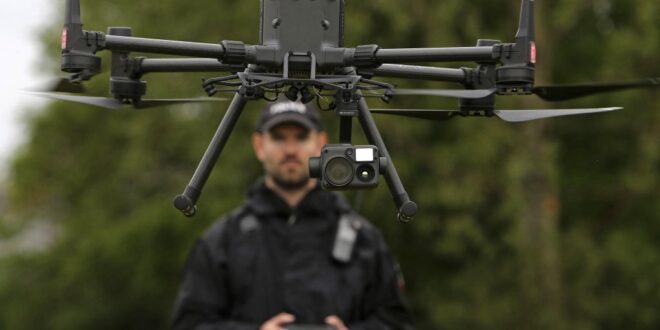The Chinese company DJI controls nearly 90% of the world market for consumer and commercial grade drones.
The excellent reporting on DJI by Kitchen tracks efforts by the company to lobby against passage of a bill called the American Security Drone Act (ASDA), now before Congress, to outlaw federal government use of DJI products entirely. What is the risk? Not only the data gathered by the drones themselves, but everything collected by the mobile app with which users control their drones and manage their DJI accounts. Like many other mobile applications, this includes a user’s contacts, photos, GPS location, and online activities.
Every DJI drone in the skies above America is as good as a hovering Chinese spy.
DJI is engaged in a fierce lobbying effort to prevent passage of the ASDA bill. So fierce that they have enlisted police officers from local jurisdictions to come to Washington and lobby congressional staffers about how great DJI drones are for their cash-strapped local forces…. DJI lobbyists from firms like Squire Patton Boggs, Cassidy & Associates, and CLS Strategies are taking no chances. The company spent $2.2 million in lobbying efforts in 2020 and $1.4 million last year on lobbying activities, according to OpenSecrets.org.
Much as they are doing with products such as solar panels, the Chinese realize that cornering the market in an area where reach equals access is critical to their long-term plans to dominate. Their pattern includes stealing technology they cannot create themselves and using any means available to aid in that theft. Therefore, every bit of access to information they can scour is of more value to them than the product used to get it.
Understanding these patterns is central to recognizing that the Chinese do this to their own people as well…. [through] many different forms of what we may baldly call blackmail.
The Wilson Center, a bipartisan think tank in Washington, reported in 2017 that a small community of PRC students and diplomats have engaged in intimidation tactics ranging from intelligence gathering to financial retaliation… It was just those sorts of concerns that led the Trump administration to create the “China Initiative” within the Justice Department in 2018. This effort generated plenty of convictions of Chinese nationals in the US for technology theft and other forms of industrial espionage. The Biden administration ended the program this year….
China’s strategy has for years hinged on infiltration by some Chinese scientists and researchers working abroad in the US and other western nations, with threats against their Chinese relatives as leverage for them to do so.
Chinese intelligence gathering in the US takes many forms and has different purposes. Most Americans are familiar with some of their means and tactics, but not with how widespread and persistent they are.
Americans may know about the malware contained in that infernal TikTok app that their children use. They may know the Chinese military’s cyber-intelligence service was likely behind many of the largest hacks of Americans’ personal data that have ever occurred. They may know from the news how US defense and intelligence policy have sanctioned Chinese telecom giant Huawei, and counseled America’s allies to reject Chinese-architected implementations of 5G networking, due to evidence that China has planted backdoors in commercial networking equipment designed to allow the Communist regime in Beijing to conduct surveillance and cyber-espionage anywhere in the world.
Do they know it extends to consumer-level drones?
Cybersecurity expert Klon Kitchen, writing for The Dispatch, recently detailed the problem with DJI, the Chinese company whose consumer and commercial grade drones control nearly 90% of the market. These popular products are cost-effective, easy to fly and operate, and send every byte of data they gather to servers in China. For this reason, they are banned by the US military and Department of Homeland Security, though still used by the FBI and increasingly by local police as “eyes in the sky” during crime events. FBI use of DJI drones is especially ironic considering bureau director Christopher Wray has warned often of the dangers to western commerce posed by the Chinese, most recently in London.
The excellent reporting on DJI by Kitchen tracks efforts by the company to lobby against passage of a bill called the American Security Drone Act (ASDA), now before Congress, to outlaw federal government use of DJI products entirely. What is the risk? Not only the data gathered by the drones themselves, but everything collected by the mobile app with which users control their drones and manage their DJI accounts. Like many other mobile applications, this includes a user’s contacts, photos, GPS location, and online activities.
To repeat: Every DJI drone in the skies above America is as good as a hovering Chinese spy.
Like other Chinese government-controlled companies such as Huawei and Hikvision, makers of the artificial intelligence systems used in facial recognition and in the repression of China’s Uyghur minority, DJI is adept at playing the Washington game. The company is engaged in a fierce lobbying effort to prevent passage of the ASDA bill. So fierce that they have enlisted police officers from local jurisdictions to come to Washington and lobby congressional staffers about how great DJI drones are for their cash-strapped local forces. As Kitchen points out, the ASDA bill is directed only towards a federal ban on these drones, but DJI lobbyists from firms like Squire Patton Boggs, Cassidy & Associates, and CLS Strategies are taking no chances. The company spent $2.2 million in lobbying efforts in 2020 and $1.4 million last year on lobbying activities, according to OpenSecrets.org.
These lobbyists are using the classic argument that it would be wrong to ban the federal government’s use of our product because so many other people are using it. This is doubtless the dilemma currently facing the app stores of Apple and Google regarding the TikTok app, another Chinese product. The TikTok app has been identified by cybersecurity professionals as containing a keystroke logger, and both Apple and Google have been pressured by the Federal Communications Commission to remove it from their app stores. “Can we really ban something that so many people are happily using?” they must be asking themselves.
Therein lies the heart of the Chinese approach. TikTok was a mobile device application that no one was asking for, yet it became an overnight sensation in most western countries. We really must acknowledge, and grudgingly admire, the brilliant insight shown by the app’s creator company, Chinese-government-controlled ByteDance, into the psyche of large numbers of young, western people. The TikTok app, pitched initially as a way to share and watch silly dance video clips, has been adopted by younger “woke” schoolteachers to “out” themselves as scheming, haranguing social justice warriors intent on smuggling sexual ideology into their classrooms and bragging about it.
This adds some context to Republican Sen. Rob Portman’s (R-OH) exasperation at a Senate hearing about the ASDA legislation, where he said:
"Again, given what the FBI has told us, what the Commerce Department has told us, what we know from reports, I can't believe we have to write legislation to force US agencies to ban the use of Chinese-made drones, particularly where the servers are in China, where the Chinese government is a part owner and a supporter of this particular company."The Chinese approach is to “capture” elite institutions and individuals in the US: politicians, leading universities, large pension funds, social media, and Hollywood among them. My latest book, Red Handed, documents this capture in the areas of politics, diplomatic and business consulting, Big Tech, academia, and on Wall Street. There is insight in the Soviet-era statement, attributed to Lenin, about capitalists “selling us the rope with which to hang them.” Yet, it is the Chinese that understood how to sell the rope at a good price.
Much as they are doing with products such as solar panels, the Chinese realize that cornering the market in an area where reach equals access is critical to their long-term plans to dominate. Their pattern includes stealing technology they cannot create themselves and using any means available to aid in that theft. Therefore, every bit of access to information they can scour is of more value to them than the product used to get it.
Understanding these patterns is crucial to recognizing that the Chinese do this to their own people as well. As Gordon Chang’s recent piece for the Gatestone Institute discusses, the Chinese Communist Party maintains tight control of Chinese people overseas through many different forms of what we may baldly call blackmail. The many stories of intimidation of Chinese students and academics in the US who speak up about human rights abuses by China, or in support for democracy in Hong Kong and Taiwanese independence, all demonstrate this.
Universities have put up with this in exchange for foreign funds for decades. They are only recently being confronted by the costs of this indulgence. For example, the former chairman of Harvard University’s Chemistry and Chemical Biology Department was convicted by a federal jury for lying to federal authorities about his affiliation with the People’s Republic of China’s Thousand Talents Program and the Wuhan University of Technology (WUT) in Wuhan, China, as well as failing to report income he received from WUT.
The Wilson Center, a bipartisan think tank in Washington, reported in 2017 that a small community of PRC students and diplomats have engaged in intimidation tactics ranging from intelligence gathering to financial retaliation. “A Preliminary Study of PRC Political Influence and Interference Activities in American Higher Education” examines PRC influence in American universities.
It was just those sorts of concerns that led the Trump administration to create the “China Initiative” within the Justice Department in 2018. This effort generated plenty of convictions of Chinese nationals in the US for technology theft and other forms of industrial espionage. The Biden administration ended the program this year, citing concerns that a broader approach was needed and in response to lobbying by Asian American groups that it unfairly targeted scientists with connections to China. Further, Assistant Attorney General Matthew Olsen also said he heard concerns from the academic community that prosecutions of researchers for grant fraud and other charges was having a “chilling effect.”
Be that as it may, China’s strategy has for years hinged on infiltration by some Chinese scientists and researchers working abroad in the US and other western nations, with threats against their Chinese relatives as leverage for them to do so. This will remain a counter-intelligence problem regardless of what the effort to expose it is called.
It is all part of the pattern. Call it sabotage by remote control.
 Eurasia Press & News
Eurasia Press & News




